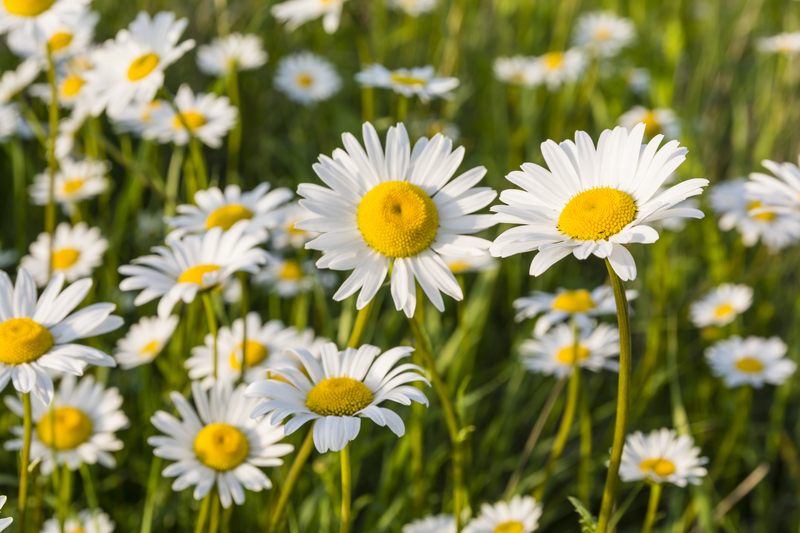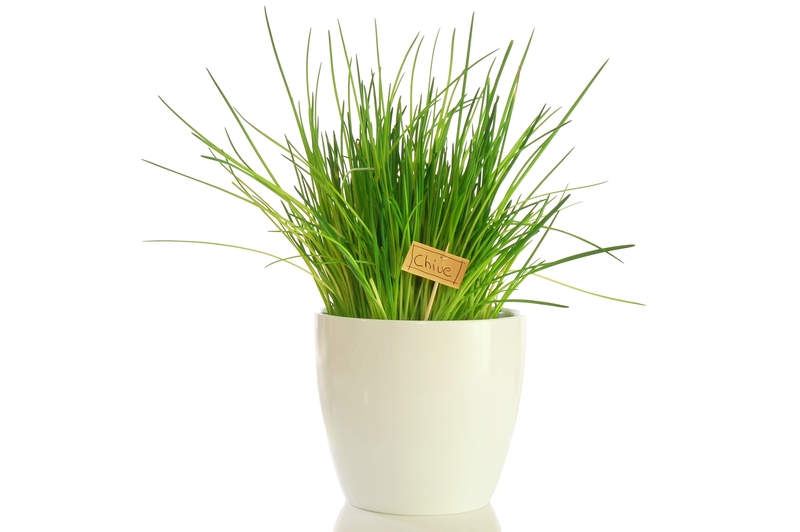Herb Garden Magic: Growing Aroma and Flavor
Posted on 24/06/2025
Herb Garden Magic: Growing Aroma and Flavor
Welcome to the enchanting world of herb gardens! Whether you are an aspiring chef, a passionate gardener, or simply someone who enjoys aromatic and flavorful dishes, cultivating your own herbs offers a magical experience. This article will guide you through the wonders of growing aromatic and flavorful herbs at home, ensuring your culinary creations burst with the freshest ingredients possible.
Why Start Your Own Herb Garden?
Imagine stepping outside your kitchen to snip a few leaves of basil, thyme, or mint to elevate your favorite dish. The art of growing herbs offers numerous benefits. Here are a few reasons to start your journey:
- Freshness at Your Fingertips: Homegrown herbs deliver maximum flavor compared to store-bought varieties, which may lose aroma and taste during transport and storage.
- Cost-effective: Growing your own herb garden is cheaper in the long run than buying fresh bunches every week.
- Gardening Therapy: Working with plants is proven to reduce stress, providing a sense of peace and accomplishment.
- Eco-friendly: Home herb gardens reduce plastic packaging and transportation emissions, making them a sustainable choice.
- Year-round Access: With indoor and outdoor options, you can enjoy herb garden magic in every season.

Choosing the Right Location for Your Herb Garden
Location is key when it comes to growing herbs with the most aroma and flavor. Here are a few considerations:
- Sunlight: Most herbs need at least 6 hours of sunlight a day. South-facing windows or balconies are ideal for aromatic plants.
- Soil: Well-draining, nutrient-rich soil is essential for healthy, flavorful herbs. Consider raised beds, containers, or window boxes if outdoor space is limited.
- Accessibility: Keep your herb garden near your kitchen or a frequented area to make harvesting effortless.
Outdoor vs. Indoor Herb Gardens
Both options have their charms. An outdoor herb garden offers more space and sunlight, while an indoor herb garden ensures year-round freshness and protection from pests and weather.
Essential Tools and Supplies
Growing a magical herb garden doesn't require fancy gear. Here's a basic list to get you started:
- Pots or planters with drainage holes
- Quality potting soil rich in organic matter
- A watering can or spray bottle for gentle moisture
- Labels or markers to identify herb varieties
- Hand trowel and garden gloves
- Pruning scissors for harvesting
Top Herbs to Grow for Aroma and Flavor
Choosing the right herbs is paramount to enjoying a flavorful and aromatic garden. Here are the most popular varieties known for their potent scent and taste:
Classic Culinary Herbs
- Basil: Renowned for its sweet aroma and essential in Italian and Southeast Asian cuisines.
- Rosemary: Woody and pine-like, perfect for roasting meats and vegetables.
- Mint: Refreshingly cool and a great addition to drinks, salads, and desserts.
- Thyme: Earthy and versatile, ideal for infusing soups, stews, and marinades.
- Parsley: Adds freshness and color to many dishes; both curly and flat-leaf types are popular.
- Coriander (Cilantro): Distinctively citrusy and found in numerous global cuisines.
- Sage: Savory and robust, often used in stuffing and sausages.
- Oregano: Intense and peppery, a staple in Mediterranean cooking.
Unusual and Fragrant Herbs
- Lemon Balm: Offers a bright, lemony fragrance, perfect for teas and desserts.
- Chives: Delicate onion flavor, fantastic in salads and as a garnish.
- Tarragon: Mildly licorice-flavored, great for sauces and dressings.
- Dill: Known for its feathery leaves and distinctive taste in pickles and salads.
Planting and Caring for Your Herb Garden
To experience true herb garden magic, proper planting and care are essential.
Starting from Seeds or Seedlings
You can start your herb garden by sowing seeds or buying young plants (seedlings). Each method has its merits:
- Seeds: Offers more variety and is cost-effective. However, some herbs (like parsley) are slow to germinate.
- Seedlings: Ideal for beginners seeking quick results and less initial fuss.
Soil Preparation
Herbs thrive in loose, well-draining soil. Mix compost or organic matter into your garden beds or containers for premium flavor and aroma in herbs.
Watering Needs
Watering is critical for growing healthy, fragrant herbs. Overwatering can lead to root rot, while underwatering results in stunted growth and weak flavors. Here are general guidelines:
- Check soil moisture: Stick your finger an inch into the soil. Water if it feels dry.
- Morning watering: Reduces leaf diseases and mimics natural dew.
- Consistent routine: Herbs prefer a regular watering schedule for lush growth.
Fertilizer and Mulching
For the best aroma and flavor in your herb garden, use a balanced, organic fertilizer every few weeks. Avoid excessive nitrogen, which encourages leaf growth but dilutes taste. Mulching helps retain moisture and suppress weeds.
Pruning and Harvesting for Maximum Aroma
Pruning not only shapes your herbs, but also increases their yields and encourages fresh growth. Here's how to keep your herb garden thriving:
- Regularly snip leaves: This stimulates the plant to produce more aromatic oils.
- Harvest early in the day: Essential oils (and thus aroma) are most concentrated before midday sun dissipates them.
- Avoid flowering: Once herbs flower, their leaves can become bitter. Pinch off flower buds to prolong leafy growth.
Herb Garden Magic for Small Spaces
You don't need acres of land to create a magical patch of herbs. Urban gardeners often rely on creative methods:
- Windowsill gardens: Grow herbs in compact containers on sunny sills.
- Vertical gardening: Utilize shelves, racks, or hanging planters to maximize space.
- Mason jar planters: Fun and decorative, ideal for growing basil, chives, or parsley.
- Balcony pots and railing boxes: Make the most of outdoor spaces with movable planters.
Preserving Your Harvest: Storing Aroma and Flavor
When your herb garden overflows with bounty, don't let any flavor go to waste! Preserving herbs ensures you can enjoy fresh aromas throughout the year.
Drying Herbs
- Air drying: Tie herbs in small bunches and hang in a dry, ventilated place, away from sunlight.
- Oven drying: Spread leaves on a baking tray and dry them at the lowest oven setting for 1-2 hours.
Freezing Herbs
- Freeze in cubes: Chop herbs and place them in ice cube trays. Cover with water or olive oil, then freeze. Perfect for adding to soups and sauces.
- Whole leaves: Lay herbs on a tray to freeze individually, then transfer to airtight bags.
Infusing Oils and Vinegars
- Herb-infused oils and vinegars are a delicious way to preserve flavor and add depth to your homemade dressings, marinades, and sauces.
Herb Garden Magic in the Kitchen
Homegrown herbs infuse every dish with uniqueness and vibrancy. Here's how you can use your fresh herbs:
- Garnishes: Sprinkle chopped chives, parsley, or cilantro for a burst of color and fragrance.
- Flavor bases: Use thyme, rosemary, and bay leaves as the backbone for soups and stews.
- Herbed butters: Mix finely chopped herbs into softened butter for a delectable spread.
- Infusions: Brew teas with mint or lemon balm for a refreshing drink.
- Pestos and sauces: Create classic basil pesto, chimichurri, or salsa verde using fresh herbs.
- Salad mixes: Tear basil, dill, or tarragon leaves into green salads for extra flavor.
DIY Herbal Remedies and Home Fragrance
The magic of a herb garden goes beyond cooking. Many herbs possess medicinal and aromatic properties:
- Lavender: Use in sachets for calming scents or infuse into oils and teas for relaxation.
- Peppermint: Brew for digestive soothing or as a natural air freshener.
- Thyme and oregano: Contain antiseptic properties, useful for homemade cough syrups and balms.
Common Challenges and Solutions in Herb Gardening
Every gardener encounters a few bumps along their magical journey. Here are top issues and how to resolve them:
Pests and Diseases
- Aphids, whiteflies, and spider mites: Spray with diluted soapy water or neem oil.
- Powdery mildew and mold: Improve air circulation and avoid overhead watering.
Herbs Not Growing Well?
- Insufficient sunlight: Move pots to a brighter spot or supplement with grow lights.
- Poor drainage: Ensure containers have holes and add sand or perlite to soil mixes.
- Over-fertilization: Stick to gentle, organic feeding schedules; too much fertilizer dilutes flavor.
Seasonal Care: Enjoying Herb Garden Magic All Year
Herb gardens can be enjoyed in every season with a little planning:
- Spring: Sow seeds or transplant seedlings as the weather warms.
- Summer: Harvest regularly, mulch to retain moisture, and watch for pests.
- Autumn: Prepare perennial herbs (like rosemary and thyme) for cooler weather or bring pots indoors.
- Winter: Grow indoors under lights or on sunny windowsills; consider overwintering hardy varieties outside with protection.

Eco-Friendly and Sustainable Herb Gardening
A truly magical herb garden is kind to the planet. Consider these sustainable tips:
- Compost waste: Recycle herb trimmings and kitchen scraps to nourish your garden soil.
- Use organic seeds and soils: Minimize chemical impact for healthier, more flavorful herbs.
- Water efficiently: Collect rainwater or use drip irrigation to reduce waste.
- Attract beneficial insects: Plant flowering herbs to support bees and butterflies.
Conclusion: Start Your Journey into Herb Garden Magic
Growing an aromatic and flavorful herb garden is a delightful and rewarding venture. From the vibrant colors and enticing smells to the endless culinary opportunities, the magic of a herb garden extends far beyond the plants themselves. With the tips and tricks shared in this comprehensive guide, you'll soon be surrounded by an abundance of freshness, enhancing your dishes and inspiring a deeper connection with nature. Begin your herb garden adventure today and experience the enchanting transformation in your home and kitchen!
Discover the magic of growing flavor and aroma--your senses (and taste buds) will thank you!
Latest Posts
Calm and Inviting: Designing Your Zen Garden Sanctuary
Crafting Perfect Outdoor Seating Areas for Your Garden
Where to Start Your Neglected Garden's New Journey



